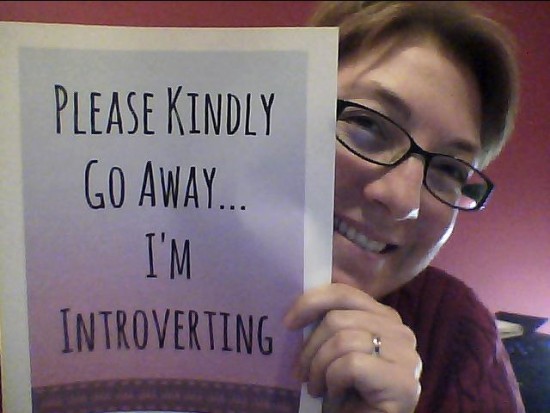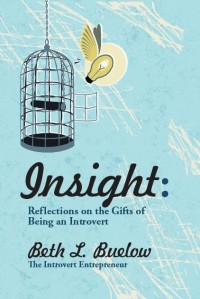Beth Buelow has become a recent source of inspiration for me. She is the founder and CEO of The Introvert Entrepreneur, a company here in the Northwest that “offers services for introverts and those who live/work/play with them.”
One of Beth’s main goals is to work with people and institutions to develop the sort of empowered, productive environments that help introverts to flourish. Beth says that the key to accomplishing that is for people of all types to understand and appreciate what it means to be an introvert in an extroverted world.
I reached out to Beth after writing about public speaking as an introvert and I’m thrilled that she agreed to do an in-depth interview with me about her work, her background, and the nature of introverts and introversion.
Want to stay in touch with Beth? You can become a fan of The Introvert Entrepreneur on Facebook and follow Beth on Twitter as well as visit her site to learn more about her background and services.
It’s not only about introverts as people; it’s about the needed balance of quiet to loud, slow to fast energy.
Beth Buelow, The Introvert Entrepreneur
JDC: Hey Beth, thanks for talking with me. First, please tell us about yourself and The Introvert Entrepreneur.

Photo © Beth Buelow
BB: Considering this question, it’s like I’m being asked, “What is the meaning of life?” That’s part of the proof that I’m an introvert at my core; telling you about me feels like a complex undertaking. I’m afraid I’ll either bore you or sound narcissistic.
So here’s the bottom-line version: I’m an entrepreneur, coach, speaker, author, wife, dog/cat mom, reader, sailor, photographer and thinker. Like many introverts, I spend too much time on social media and the internet. And I’m always — always — looking forward to my next long nap. If I could, I think I’d be like Linus from Charlie Brown, and carry a blanket with me everywhere!
My company, The Introvert Entrepreneur, exists to serve and celebrate introvert energy in our world. It’s not only about introverts as people; it’s about the needed balance of quiet to loud, slow to fast energy.
I coach introverts on how to find their natural voice, make the most of their strengths, live in alignment with their inner truth, and build a sustainable life, personally and professionally.
…it was like someone had turned the light on in my brain.
Beth Buelow, The Introvert Entrepreneur
JDC: When did you first discover that you were an introvert and how did that change your perception of yourself and how you related to other people?
BB: I was in graduate school, working late on a project in the computer lab and procrastinating. My favorite time-waster-that-felt-legitimate was exploring the psychology section of Yahoo. My entire life, I’ve loved quizzes and assessments and anything that told me something about myself.
I stumbled upon a Myers-Briggs Type Indicator assessment and took the test. I came out as an INFJ, and it was like someone had turned the light on in my brain.
I’d always identified myself as somewhat shy and socially awkward, but when I read the definition of introvert, my perception completely shifted. I realized that there was a natural explanation for my behavior. The idea that maybe I wasn’t shy, but that people just exhausted me, changed the way I saw my potential.
I read up on everything I could find about being an introvert and felt understood and validated. I wish I could say that the knowledge immediately improved my life or relationships. I had other gremlins to tackle. It’s only been in the past 10 years that I’ve been able to fully embrace my love and need for solitude and quiet, and stand by it in the face of the pressure to be super social.
…being entrepreneurial was the way to make things happen.
Beth Buelow, The Introvert Entrepreneur
JDC: What was your journey to entrepreneurship like? How did you decide that this was the right focus for you?
BB: The story of how I became an entrepreneur is probably reflective of many others, especially introverts. I had my own freelance writing/research business back in 2000, and let it go when my husband and I moved and I immediately landed a job I really enjoyed. Another move in 2007, this time cross-country and without employment waiting for me, left me feeling a bit lost.
Then I discovered coach training and decided to become certified. It was more about becoming a coach than being an entrepreneur. But the more I got into it, the more I realized that being a coach was awesome, but being entrepreneurial was the way to make things happen.
I’ve been making up businesses since I was seven years old; the seeds had been planted long ago. Now I had the hook to make an entrepreneurial venture work. I knew it was right because I felt it in my gut, and in my heart (that’s the INFJ kicking in!). And once I found my niche of introversion (actually, it found me, but that’s a longer story), it all clicked into place.
At its core, introversion is about how a person gains and drains energy.
Beth Buelow, The Introvert Entrepreneur
JDC: Many people confuse the concept of introversion with shyness, anxiety, and sensitivity. What’s your take on this and what do you consider to be the definition of introversion?
BB: Oh, the confusion! It’s really amazing, but not surprising. I think a lot of it stems from our experiences growing up introverted in a society that values extroverted traits. When we’re first starting to walk, talk and form relationships, our parents and teachers are watching for a range of behaviors that indicate that we’re “normal.”
In particular, they want to see that we know how to play well with others… that we’re friendly, social and interested in other people. When we decide we’d rather read a book, go off to play by ourselves and get overwhelmed around too many people, we’re labeled as shy or sensitive. So we grow up with that label and rarely think to question if it’s accurate. And while we may indeed be shy or sensitive, it’s important to know whether we are also introverted.
It’s fortunate that times are changing and awareness is growing. At its core, introversion is about how a person gains and drains energy. We gain energy in solitude and quiet, and drain energy during social interaction. We live from the inside out, more tuned-in to our internal world than our external environment. It doesn’t mean that we’re anti-social or don’t like people. We simply prefer to interact in small doses (in terms of number of people and time) and need ample time alone to replenish our energy reserves.
What about the people who are self-professed introverts who appear to be extroverts? Chances are that they have learned two things: how to recharge their energy before and after an interaction, and how to comfortably project that energy outward as needed. They’ve also probably realized that being outgoing can be treated as a skill. Like any skill, they practice and have patience with themselves as they learn.
The best gift you can give yourself is honoring your truth…
Beth Buelow, The Introvert Entrepreneur
JDC: Some introverts look at extroverts with envy because of the ease they have with social interactions. How can introverts build up or rebuild their confidence and pride?
BB: Self-confidence is really about self-acceptance. It’s important to embrace your introversion. If you decide to fight it, you’ll wear yourself out. Accept your natural preferences for quiet, solitude, smaller circles of friends and lower stimulation environments. Appreciate that you enjoy your own company and that saying “party of one” doesn’t have to be a scary thing.
Read books like Susan Cain’s Quiet: The Power of Introverts in a World That Can’t Stop Talking or my own Insight: Reflections on the Gifts of Being an Introvert, and take to heart the message that being an introvert is an asset, not a liability.
Since knowledge is power, take what you’ve learned and use it to influence your choices. It’s OK to only go to one networking event a week. It’s OK to leave the party before it’s over. It’s OK to say “no” when you really want to be alone or stay home. The best gift you can give yourself is honoring your truth; if that truth says “I prefer to be alone,” say yes and feel your confidence build.
I take care to focus on building relationships with people who nurture me, rather than suck the life out of me.
Beth Buelow, The Introvert Entrepreneur
JDC: Many people think that introverts hate other people and just want to be hermits away from society. But with your business, blog, and social media channels, you’re constantly interacting with all sorts of people. How do you manage your energy and time?
BB: It’s something I work on every day. I give myself what I call “space and grace” to move through my day and my tasks in a way that respects my natural energy and rhythms. Sometimes that means working in the evening, or taking an afternoon power nap. I try not to be too hard on myself when I’m not as productive as I think I should be (it’s often because I’ve severely overestimated how much can happen, and underestimated the amount of time something will take!).
In short, I’m driven and motivated, while also being compassionate with myself. I take care to focus on building relationships with people who nurture me, rather than suck the life out of me. I arrange my schedule so that there’s plenty of breathing room between clients, presentations and other people activities.
Don’t assume that because an introvert doesn’t speak up that she has nothing to say.
Beth Buelow, The Introvert Entrepreneur
JDC: How can introverts in professional or business settings best work with extroverts… as well as with other introverts?
BB: On a fundamental level, it’s essential to understand and respect different work styles. Introverts tend to prefer small team or solo projects, written communication, private work areas and plenty of quiet space to think things through. Extroverts enjoy bigger group meetings and projects, brainstorming and thinking out loud, and being social with colleagues.
This means a few things for introverts working with extroverts:
- Depend on your listening skills to support extroverts in problem solving. Don’t feel pressure to keep up verbally; simply ask for time to think things over if you’re asked for feedback and you’re not ready to give it.
- Speak up if you feel you’re not being heard. Extroverts expect you to speak up. Decide if you can wait until after the meeting, or practice interjecting at appropriate moments.
- Know that extroverts prefer face-to-face, verbal communication. Respect their preference while honoring your needs by scheduling short, focused meetings as needed to clarify key information.
As for anyone working with introverts, here are some things to keep in mind:
- Understand that introverts need space and quiet to gather and process their thoughts. Brainstorming sessions can be stressful (unless you ask the introvert to facilitate or scribe). Share the brainstorming topic or question in advance, so they can get a head-start on thinking of ideas to contribute. Allow people to submit ideas in writing, either during or after the meeting.
- Provide gentle nudging if your introvert colleague is moving too slowly for you or the situation. Give him permission to share something that’s imperfect or unfinished.
- Don’t assume that because an introvert doesn’t speak up that she has nothing to say. You may have to ask for feedback directly. Refrain from prefacing your request by saying “You’ve been quiet over there,” which puts her on the spot.
It’s often easier for an introvert to be in charge than to be one of dozens of participants.
Beth Buelow, The Introvert Entrepreneur
JDC: Are the scales tipped against introverts in professional settings? What can they do to keep growing their careers?
BB: Our workplaces and hiring practices do tend to favor extroverted qualities. You’ll see words in job postings such as friendly, outgoing, people-person, or highly social to describe the ideal candidate. Not that there’s anything wrong with that, or that those traits aren’t desirable. It’s simply that highly qualified introverted candidates might feel deterred from even applying if they don’t identify with those descriptors. They might figure the personality cards are stacked against them, so why bother?
Well, bother! An introvert who has a healthy relationship with her energy knows that with proper and intentional self-care, she can turn on the extroverted energy when she needs to. It just means it’s that much more important to get a sense of the demands when going through an interview. Otherwise, you might be a good fit in every way except energy, and you and your colleagues will be miserable.
I recommend first knowing what you’re willing to do (Be on a 30-person team? OK. Sign up for the company softball league? No can do. Or maybe it’s the other way around!). Ask questions during the interview that help you discern what will be expected.
Second, find a mentor within your company, someone you can trust and turn to for advice. That person can also give you feedback about skills you want to strengthen.
Third, watch for opportunities to be in a leadership role and be in front of the group. It’s often easier for an introvert to be in charge than to be one of dozens of participants.
And finally, work with a coach or other professional to identify your strengths, and set goals that will amplify them. It’s funny to think of an introvert amplifying anything, isn’t it?! But our power is in our quieter strengths. We have to learn to channel them.

Photo © Beth Buelow
JDC: What does success look like for introverted entrepreneurs like yourself? When will you know when you’ve got it made?
BB: I define success by one simple word: freedom. When I have it made, I’ll have an underlying sense of freedom to do or not do, be or not be, what I choose. I’ll have a trusted circle of colleagues, clients, friends and champions that gives me the flexibility to say yes or no according to how well something aligns with my values, strengths and objectives.
There will be freedom from superficial worry about time or money. And I will feel free to experiment, fail, succeed or start completely over, all in service to the bigger picture. I’ll have the freedom to balance quiet with conversation, solitude with socializing, and to do it all on my own terms.
Reading this, I think I’ve already got it made! All of these things are at my disposal, if I simply trust myself and the work. And no matter how you personally define success, or how far away it seems, you probably have more of it at your disposal — right now — than you realize.
Know this: being an introvert does not mean you are broken or need to be fixed.
Beth Buelow, The Introvert Entrepreneur
JDC: Outside of work, what are your top five tips on how introverts can survive in this extroverted world?
BB:
- Know this: being an introvert does not mean you are broken or need to be fixed. There is nothing wrong with you just because you’re an introvert. Some of history’s greatest innovators and leaders were introverts. You have infinite capacity to achieve what you want, many times because of – not in spite of – your introvert strengths.
- Shift how you see your introversion. Consider it as an energetic trait, rather than a personality trait. This helps to tease introversion apart from shyness and diffuse the stereotype that introverts are snobby misanthropes. If we look at introversion as energy, we can make better choices that give us room to show up socially in a way that is more outgoing, but from an introverted context. Learn to tap into your natural extrovert energy (yes, you have some!), rather than thinking you need to become an extrovert.
- Practice honoring what you need. Social pressure can cause us to say yes to every invitation, or to feel like we have to “work the room” or be constantly “on.” If you need a break, take a break. If you want to stay home instead of go out, stay home. Or at least, work out a compromise (for instance, drive alone so that you’re free to come and go as you wish). Sometimes, you may not feel like you have a choice; you always have a choice. If you choose to go to the party or carpool, don’t waste energy wishing you’d said no. Enjoy the experience for what it is, or say no in the first place.
- Appreciate the fact that you can enjoy your own company. That’s an extraordinary gift! It means you can travel, work or play by yourself, without feeling lonely. Ultimately, all we have is ourselves, so having the capacity to be your own best friend is a blessing.
- Recognize that being comfortable with networking, socializing and other things that involve lots of people is a matter of skill and self-preservation. Protect your alone time so that you have energy for the social stuff. Read up on how to make small talk, then go to events so you can practice. Even extroverts aren’t born with the gift of gab or fearlessness. Treat it as a new skill to learn, choose to dive in and do it your way.
Many thanks again to Beth Buelow of The Introvert Entrepreneur for participating in this interview!
Introverts: now’s the time for you to speak up, to make your voice heard, and to help out your fellow introverts (like me!).
You’ve read Beth’s tips on how introverts can survive in an extroverted world – do you have any more to add to the list? What tricks and tips have you learned over the years? Please share them below in the comments so that we can learn from you!


Pingback: Are Introverts or Extroverts Internet Entrepreneurs? | Internet Entrepreneurship
Pingback: Listly List - J Colman Content Audit